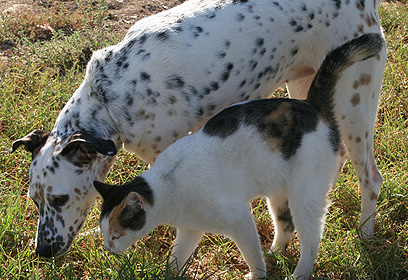
State to fine animal rights abusers
Knesset committee okays hefty administrative fines on Animal Welfare Law offenders without indictment; owners who cut off dogs' tails will pay $1,000
The Agriculture Ministry said that approving these regulations will allow for fast and effective enforcement when it comes to animal rights.
"Administrative fines save us the trouble of going to court, which is usually a long process in which the felon isn't always convicted. With fines, the felon will have to pay on the spot and therefore feel the gravity of the offense," said an Agriculture Ministry official.
The administrative felonies were approved during the discussion but officials have not yet set an implementation date due to an objection from Knesset Member Uri Maklev (United Torah Judaism) regarding the maintenance conditions of chickens for Kapparot.
Maklev requested to discuss this matter once again, however because a second debate has not been scheduled some Agriculture Ministry officials and members of animal rights groups worry that the fines will not be put into effect.
Fine for cutting ears and tails
The majority of the regulations concern the way farm animals are transported and kept, as well as the caring for and maintaining of pets, such as dogs, cats, birds and reptiles. They further state that poisoning or abusing of animals will still be considers as criminal offense by law, penalized not only financially but also send offenders to prison for up to three years.
The committee members decided to increase the fine for cutting through the tissue of an animal, so if for instance one was to cut off the ears or tail of an animal for the purpose of exhibition and beauty, he would be forced to pay NIS 4,000 ($1,088) instead of NIS 2,000 ($544).
It was also decided that anyone who doesn't take out his dog for a walk at least twice a day for a half hour or more, or allows the dog to go out to a yard no smaller than 16 cubic meters (20 cubic yards), will have to pay NIS 500 ($136).
A person who fails to provide his pet with enough water and food will be fined NIS 1,000 ($272) per animal, and the same goes for a person who exposes his pets to harsh weather conditions. If you were to tie your dog up in one spot for over five hours using a really short strap, expect to be fined NIS 1,000.
As far as farm animals go, the committee ruled that organizing an animal show without a license will cost the organizer NIS 2,500 ($680). Failing to provide an animal with medical care or making a horse or mule pull a wagon carrying over a ton of weight both carry a fine of NIS 2,000 ($544).
Holding a calf in an isolated cell without the possibility of laying down, standing and licking himself will cost the offender NIS 1,000 per calf, and lack of ventilation will cost him NIS 3,500 ($952).

Didn't walk your dog? Pay up (Photo: Baruch Feigenbaum)
Enforcement issues
The regulations approved on Wednesday as administrative offenses came into force over two years ago. They regulate almost every aspect of animal rights in homes, businesses, natural habitat, pensions, petting areas and zoos. For example, it was decided that an animal cannot be held in an area not suitable for its size and needs.
The Agriculture Ministry says the regulations will be enforced by the Plants and Animals Supervision Unit according to information they receive and public complaints. The Ministry is also considering authorizing the Police Environmental Unit and the Green Police to help enforce the regulations. However, as this issue concerns animal welfare law, there is no plan to deploy local supervisors.
Attorney Yossi Wolfson of Let the Animals Live organization said: "We hope this will lead to enforcement of a law that has existed for years, but was never implemented. We suggest that all animal owners study the regulations and begin to carry them out."
Wolfson addressed the Kapparot issue saying this custom was never forbidden. "The prohibitions only concern the conditions of which the chickens are kept in while they await slaughter."
The Israel Animal Guard Chairman Doron Brenner is not so optimistic, fearing that MK Maklev's objections is enough to call off or stall the approved regulations.
- Follow Ynetnews on Facebook










